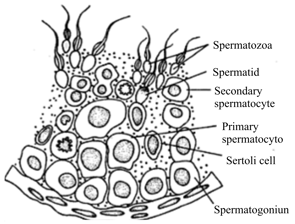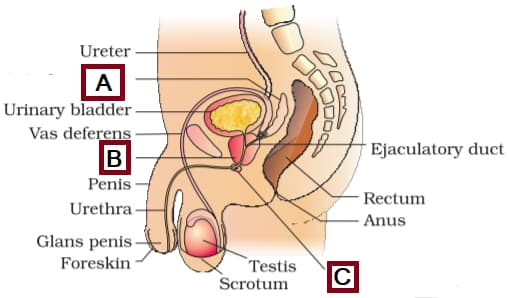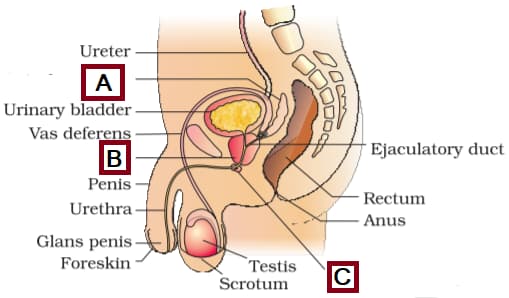Male Reproductive System
Male Reproductive System: Overview
This Topic covers sub-topics such as Male Reproductive System, Prostate Gland, Testes, Scrotum, Epididymis, Cryptorchidism, Androgens, Vas Deferens, Seminiferous Tubules, Seminal Vesicle, Sertoli Cells, Leydig Cells and, Ejaculatory Duct
Important Questions on Male Reproductive System
Cells that produce testosterone in the presence of luteinizing hormone (LH) are:
The diagram given below is representing:

Penile urethra is also called as:
In man, coagulated semen liquifies in vagina of female due to presence of an enzyme. Name it:
I. Fibirnogenase
II. Fibrinolyase
III. Fibrinolysin
IV. Fibrinolysinase
Which is the correct answer?
Select the correct matching.
Androgen regulates the ____ of male accessory sex organ.
A. Anabolic effect on protein and carbohydrate metabolism.
B. Influences male sexual behaviour (libido).
C. Stimulate spermatogenesis.
D. Muscular growth, aggressiveness and low pitch voice.
Above are the functions of which of the hormone?
Rete testis opens in the
The sperm undergoes physiological maturation and acquire increased motility and fertilizing capacity in
Read the following statements and select the correct ones:
I. The prostate glands are present underneath the urinary bladder.
II. The secrete of seminal vesicle contains fructose.
III. The sperm matures in the vasa deferentia.
Sertoli cells are called
Assertion (A): During coitus, around 200 to 300 million sperms are ejaculated by human male.
Reason (R): Only few reach the isthmus-ampullary junction for process of fertilisation.
Choose the correct option.

Each testicular lobule contains _____ convoluted seminiferous tubules.

Urethral meatus refers to the:
Presence of ________ is an indication of abdominal origin of testis.
Which of the following substances are present in semen?
Which of the following cells provide nutrition to sperm?
The yellowish and sticky secretion from the seminal vesicle contains
